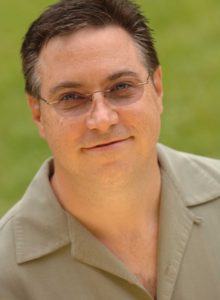
Snippets of life’s experiences can make for realistic scenes in a fiction book. That was certainly the case for David Ryan. His years as a journalist gave him behind-the-scenes knowledge of sports and police work. These details and experiences made their way into his book Dead Odds. It won Gold for Thriller or Suspense in the 2019 Royal Palm Literary Awards. David talks journalism, staying the course, and marketing in this week’s RPLA showcase.
David’s Writing Journey
My journey started out on another direction. My initial goal was to be a broadcaster. That’s what I envisioned through high school and my first two years of college. Then I took my first journalism class. The professor was a former reporter and editor at some papers in the Midwest, and we were writing news stories and features for the final hour of class. When we handed in our assignments, he would say, “Is it perfect?” We’d go back and rewrite. When we handed them in for good, he said, “Let’s wager.” Inevitably, everyone in class had bets going against the teacher. We had a three-hour final exam, and he came in and gave us one of the easier writing assignments of the semester. We all turned in our stories, and he announced, “Now we’re going to pay off our bets.” He marched us down to The Strip, which was where all the restaurants and bars were, and we ate pizza and drank beer for several hours listening to him tell stories about working in newsrooms and dealing with real editors and real reporters.” I was hooked. I changed my major the next week.
That summer, my supervisor at a restaurant where I worked had a brother who edited a local sports magazine, and he hired me as a freelancer feature writer. From there I joined the school newspaper staff and worked weekends at the local paper taking sports scores over the phone. (This was pre-internet).
My 30-year newspaper career was underway, and for almost all of that time it provided me with great joy. The daily structure of working a beat, filing one or more stories a day while working ahead to the next day and the next week gave me a solid background that continues to serve me. Yet in the middle of my journey, I recalled something out of the blue: Before my junior year, I interviewed for a summer internship with a sports editor in Mississippi, and he asked me what my career goal was. I blurted, “To write books. I want to write novels.” He shook his head and chuckled. I didn’t get the internship, but his reaction lodged in my subconscious. Later, after many years, it fueled me. I realized that my answer stemmed from a boyhood of reading mysteries and autobiographies, but then working and paying the bills got in the way.
I was fortunate in two other ways. After I finished the first draft of the book, I found myself in a new job: heading up the paper’s breaking news team, otherwise known as the crime team. I suddenly had a handful of reporters who spent their days talking to cops. Those reporters, many of whom are named in the book’s acknowledgements, helped me understand the ins and outs of police work. In addition, my mom’s second husband was a long-time FBI agent, and I have a sister in the bureau. They helped me get some details right.
The Winning Entry, Dead Odds 
Logline: FBI agent Conrad Keane confronts his dysfunctional past when the death of estranged brother leads to the realization that he never really knew his sibling—and to a serial killer.
The final story is not the book I planned to write. (Guess that makes me a pantser.) During the end of my time writing sports, I embarked on an investigative series about amateur sports in Central Florida and across the country. As wholesome as they can be, youth sports organizations are typically fiefdoms, large and small. They are usually controlled by a small group of people who too often operate for their benefit. Oh, kids gets to play sports they love, and their parents get to watch them, but money changes hands behind the scenes. It was a classic example of seeing how the sausage gets made and suddenly not being hungry any more.
I wrote a series of articles, but I filed away a number of the anecdotes and characters I came across during my reporting. As I plowed through the first draft of Dead Odds, I realized the story was not compelling enough to succeed. I ended up making the plot based on real experiences in areas I was familiar with: college sports and gambling. I had written about college sports for more than three decades, and when I was the Florida State beat writer, FSU’s football program went through a gambling scandal. I learned a lot from professional gamblers who made themselves available to talk.
Read an excerpt of Dead Odds here.
“Dear Me,” (Advice to My Younger Writing Self)
Even though I had been a writer and editor my entire professional life, and even though I had talked to other reporters who had published fiction and non-fiction books traditionally, the sheer amount of what I didn’t know about writing a book was, in retrospect, stunning. Whatever advice I gave myself back then probably was the wrong advice because it took too long to get the first draft done—and then took even longer to get the final draft done. The three things that kept me going were thoughts that came up in varying stages of the process. And these were mostly things that stuck in my head after going to numerous writers conferences and hearing published authors share their stories.
Write something every day. Even if the words don’t make any sense, you have to get something on paper. The more words you write today, the closer you are to the finish line. I’ll never forget hearing Stephen Hunter speak one day in the 1990s, probably five years before I started writing the book. He is a Pulitzer-winning movie critic, and he told a story about how just about every professional friend he had was either in the process of writing a book or was planning on writing a book. He said that most of them, many of them, never wrote a book. “Why?” he said. “Because they never finished it.” So when I started, all I ever wanted to do was finish it. The second half of that “every day” advice was hammered home by Reed Farrel Coleman, who I first met when I was well into my fourth or fifth draft. His advice: “Writing is a journey, not a destination. Writing is rewriting. You have to love the creative process. Otherwise, you won’t produce the work you want.”
You’re in good company, and it’s a large club, so relax, accept yourself, and do the work. When you get to know other authors, even ones whose books are beloved and whose sales are mind-blowing, you learn that many of them have the same critical thoughts running through their heads as you do. “This sucks.” “No one will publish this.” “I’m not sure I can write my way out of this box I’ve stuck my protagonist in.” But you learn if you do the work, trust your gut, and rely on your most honest readers, you’ll get the result you want.
Find the parts of your author platform you like and commit to building those parts. I like Twitter, so that’s something I’ve enjoyed, even though I need a LOT more followers. I felt that building a nice website was important, so I focused some on that. I have a Facebook page, but I don’t feed it as much as I should. I have an Instagram account, but I am rarely on it. You have to have a presence out there, and I always opt for ones that are enjoyable.
Other Works by David
I have a large body of work in the online archive at the Orlando Sentinel, where I spent most of my career. I wrote a non-fiction coffee table book about Florida State University’s first football national championship, though you’d have to dig into eBay to find a copy. Well, unless you robbed my home office.
I still write an occasional blog post at DavidRyanBooks.com/blog.
Stay Connected
I spend waaaay too much of my time on Twitter (my lunch companion), where I have had to learn to behave. Any time somebody tags me @TheDavidRyan, I respond. I spend less time on Facebook, but my Facebook page is here. My website is DavidRyanBooks.com, and I answer all comments directed toward me and all emails sent to me from there. I have an Instagram account, but I need more time or money to hire an assistant before I divert myself there. Anyone can always just plain email me at David@DavidRyanBooks.com.
More about RPLA
The Royal Palm Literary Awards competition is a service of the Florida Writers Association established to recognize excellence in members’ published and unpublished works while providing objective and constructive written assessments for all entrants. Judges include literary agents, publishers, film producers, current or retired professors, teachers, librarians, editors, bestselling and award-winning authors, and journalists from across the nation. Entries are scored against the criteria set by RPLA using rubrics tailored to each genre. Winners are announced at the annual FWA conference during the RPLA awards banquet. To learn more about RPLA, click here for the guidelines.


richard jeppesen
Enjoyed your article! I find the more I learn, the more rules there are to abide by in learning this craft of writing fiction. It occurs to me, that writers should beware of losing their recipe. I do not like using the word “that,” for example. “I shot the man trying to kill me.” And my editor advises: “I shot the man that was trying to kill me.”
I like the visual simplicity of: “You son of a bitch.”
but editor changes it to: “You are a son-of-a-bitch.
Arielle Haughee
Every editor has a different style. Overall, the goal is to help get your manuscript as ready-to-go as possible. You also don’t have to agree with everything an editor says! (I say this as an editor.)